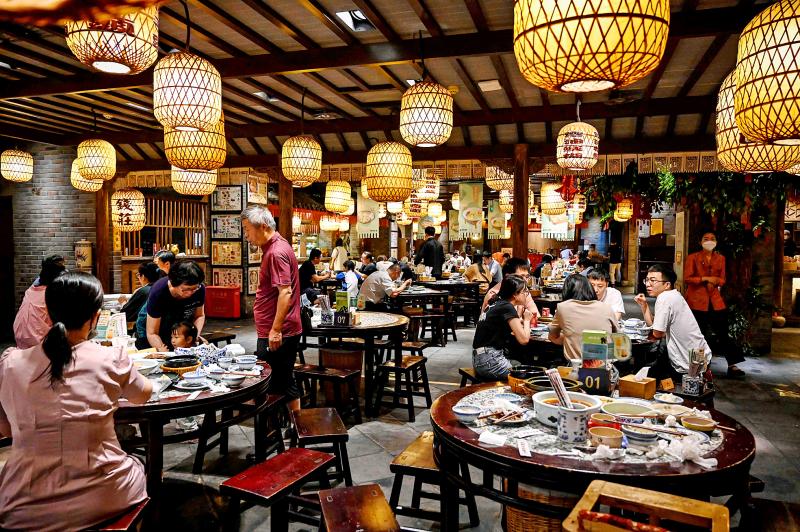China’s services activity contracted more than expected last month, with spending figures over the long weekend showing that a hit to consumer spending from COVID-19 curbs could linger through this month.
The Caixin China Services purchasing managers’ index (PMI) rose to 41.4 last month from 36.2 in the previous month, Caixin and S&P Global said in a statement yesterday, missing the median estimate of 46 in a Bloomberg survey of economists.
A reading below 50 signals a contraction.

Photo: AFP
COVID-19 restrictions in major Chinese cities began easing last month as case numbers dropped, raising hopes of a pickup from the worst activity levels since early 2020. Shanghai began lifting its two-month long lockdown last week and Beijing has rolled back restrictions as well.
However, the road to recovery could be a long and bumpy one, with regular COVID-19 testing becoming the norm and some controls remaining in place.
Figures from the three-day Dragon Boat Festival from Friday last week showed spending remains depressed.
Domestic tourism revenue dropped 12.2 percent from a year ago, while the number of trips made was down 10.7 percent, data from the Chinese Ministry of Culture and Tourism showed.
China’s service industries posted further declines in business and new orders last month, the PMI statement said.
“May’s reading was the
second-lowest since February 2020, as China’s COVID-19 epidemic still weighed heavily on services activities,” Caixin Insight Group (財新智庫) senior economist Wang Zhe (王?) said in a statement.
“Entrepreneurs overall were still confident that the COVID-19 epidemic will be brought under control, though some remained concerned about a resurgence of COVID-19 in the future,” he said.
Citigroup Inc economists said the drop in travel and spending over the long weekend was smaller compared with those seen during the Workers’ Day holiday last month, which suggest a recovery is under way.
The improvement will likely accelerate from this month onward, they said.
The Caixin survey findings are largely in line with those in the official non-manufacturing purchasing managers’ index, which increased to 47.8 from April’s 41.9, but stayed below the cutoff 50 mark.
The official survey tracks larger companies and includes the construction sector, while the Caixin survey focuses more on smaller ones.

Vincent Wei led fellow Singaporean farmers around an empty Malaysian plot, laying out plans for a greenhouse and rows of leafy vegetables. What he pitched was not just space for crops, but a lifeline for growers struggling to make ends meet in a city-state with high prices and little vacant land. The future agriculture hub is part of a joint special economic zone launched last year by the two neighbors, expected to cost US$123 million and produce 10,000 tonnes of fresh produce annually. It is attracting Singaporean farmers with promises of cheaper land, labor and energy just over the border.

US actor Matthew McConaughey has filed recordings of his image and voice with US patent authorities to protect them from unauthorized usage by artificial intelligence (AI) platforms, a representative said earlier this week. Several video clips and audio recordings were registered by the commercial arm of the Just Keep Livin’ Foundation, a non-profit created by the Oscar-winning actor and his wife, Camila, according to the US Patent and Trademark Office database. Many artists are increasingly concerned about the uncontrolled use of their image via generative AI since the rollout of ChatGPT and other AI-powered tools. Several US states have adopted

KEEPING UP: The acquisition of a cleanroom in Taiwan would enable Micron to increase production in a market where demand continues to outpace supply, a Micron official said Micron Technology Inc has signed a letter of intent to buy a fabrication site in Taiwan from Powerchip Semiconductor Manufacturing Corp (力積電) for US$1.8 billion to expand its production of memory chips. Micron would take control of the P5 site in Miaoli County’s Tongluo Township (銅鑼) and plans to ramp up DRAM production in phases after the transaction closes in the second quarter, the company said in a statement on Saturday. The acquisition includes an existing 12 inch fab cleanroom of 27,871m2 and would further position Micron to address growing global demand for memory solutions, the company said. Micron expects the transaction to

A proposed billionaires’ tax in California has ignited a political uproar in Silicon Valley, with tech titans threatening to leave the state while California Governor Gavin Newsom of the Democratic Party maneuvers to defeat a levy that he fears would lead to an exodus of wealth. A technology mecca, California has more billionaires than any other US state — a few hundred, by some estimates. About half its personal income tax revenue, a financial backbone in the nearly US$350 billion budget, comes from the top 1 percent of earners. A large healthcare union is attempting to place a proposal before